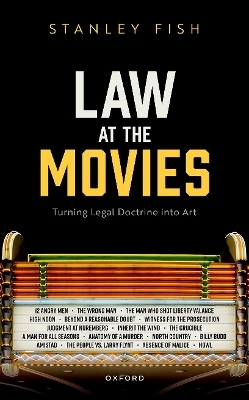
Law at the Movies
Oxford University Press (Verlag)
978-0-19-889872-6 (ISBN)
This book asks "How can legal doctrine be turned into filmic art?" By "legal doctrine" Stanley Fish does not mean the sonorous abstractions that usually accompany the self-presentation of law--Justice, Equity, Equality, Liberty, Autonomy, and the like. Rather he has in mind the specific rules and procedures invoked and analyzed by courts on the way to declaring a decision--lawyer/client confidentiality, the distinction between interdicted violence and the violence performed by the legal system, the interplay of positive law and laws rooted in morality, the difference between civilian law and military law, the death penalty, the admissibility of different forms of evidence. In the movies he discusses, these and other points of doctrine and procedure do not serve as a background, occasionally visited, to the substantive issues that drive the plot and provide the characters with choices; they declare the plot, and character is formed and tested in relationship to their demands. Apparently technical matters are pressed until they occupy both foreground and background and become the movie's true subject. If large, abstract concepts emerge, they emerge at the back end of doctrine and are, in effect, produced by doctrine. These are not law-themed movies; they are movies about the unfolding of legal process.
Stanley Fish is Davidson-Kahn Distinguished University Professor and Professor of Law at Florida International University in Miami, and Dean Emeritus at the College of Liberal Arts and Sciences and Distinguished Professor of English, Criminal Justice and Political Science at the University of Illinois at Chicago. In addition to being one of the leading public intellectuals in the US, Fish is an extraordinarily prolific author whose works include over 200 scholarly publications and books, including The First: How to Think About Hate Speech, Campus Speech, Religious Speech, Fake News, Post-Truth, and Donald Trump (2019), Winning Arguments: What Works and Doesn't Work in Politics, the Bedroom, the Courtroom, and the Classroom (2016), and Versions of Academic Freedom: From Professionalism to Revolution (2014).
Introduction
1: Liberal Heroism and Reasonable Doubt: 12 Angry Men
2: The Law as Blind Machine: The Wrong Man
3: The Law Emerges from Violence: The Man Who Shot Liberty Valance and High Noon
4: The Law as the Object of Manipulation: Beyond a Reasonable Doubt and Witness for the Prosecution
5: Natural Law vs. Positive Law: Judgment at Nuremberg
6: The Law's Dogma and Religious Dogma: Inherit the Wind
7: Visible and Spectral Evidence: The Crucible
8: Man-made Law as a Refuge from Both the Devil's Assaults and God's Commands: A Man for All Seasons
9: Law as Craft: Anatomy of a Murder
10: Sex, Class, and Class Action: North Country
11: Speech, Radical Innocence, and the Law: Billy Budd
12: The Law and Storytelling: Amistad
13: Free Speech for Good or Ill: The People vs. Larry Flynt and Absence of Malice
14: Poetry Is Against the Law: Howl
Conclusion: No More Delivered than Promised
| Erscheinungsdatum | 02.03.2024 |
|---|---|
| Reihe/Serie | Law and Literature |
| Zusatzinfo | None |
| Verlagsort | Oxford |
| Sprache | englisch |
| Maße | 140 x 225 mm |
| Gewicht | 378 g |
| Themenwelt | Kunst / Musik / Theater ► Film / TV |
| Recht / Steuern ► Allgemeines / Lexika | |
| Recht / Steuern ► EU / Internationales Recht | |
| Sozialwissenschaften ► Kommunikation / Medien ► Medienwissenschaft | |
| ISBN-10 | 0-19-889872-X / 019889872X |
| ISBN-13 | 978-0-19-889872-6 / 9780198898726 |
| Zustand | Neuware |
| Informationen gemäß Produktsicherheitsverordnung (GPSR) | |
| Haben Sie eine Frage zum Produkt? |
aus dem Bereich


